Four young Ontario farmers were part of the Ontario Federation of Agriculture’s board and staff delegation that attended the Canadian Federation of Agriculture annual meeting in Ottawa recently.
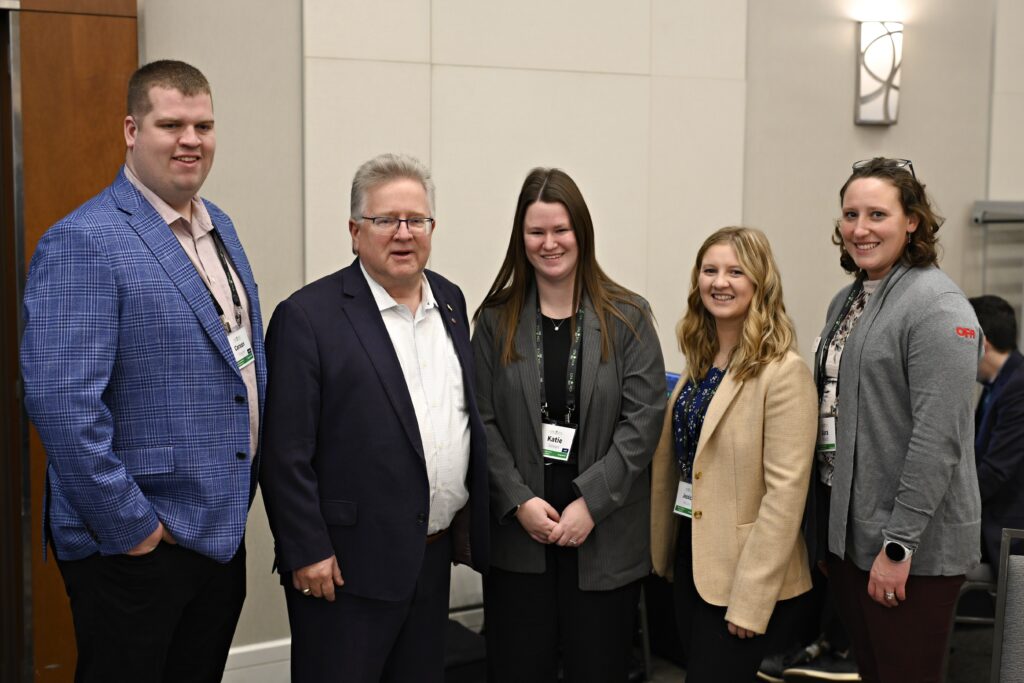 For the past several years, the OFA has invited future agriculture leaders to attend this event as part of the organization’s approach to leadership development.
For the past several years, the OFA has invited future agriculture leaders to attend this event as part of the organization’s approach to leadership development.
The OFA believes strongly in supporting and encouraging our next generation of farm leaders and providing them with opportunities to learn more about advocacy for agriculture and why it matters that our sector is represented with a strong voice.
This year, for the first time, the CFA annual meeting also included a special program for young farmers, which attracted more than 35 participants from across the country representing many different regions and farm types.
Here are this year’s young OFA leaders and their impressions of their week at CFA.
Jessica McCann is a beef and grain farmer from Milton. She works alongside her family on their farm and in their small butcher shop that provides beef to the local community and is part of the staff team at Farm & Food Care Ontario. Jess holds an undergraduate degree in agriculture from the University of Guelph and a Master’s in Cooperatives, Agri-Food, and Sustainable Development from University College Cork in Ireland.
Daniel Chiappetta is a first-generation grain farmer in Simcoe County where he grows corn, soybeans and wheat. A graduate of the University of Guelph agribusiness program, he is a delegate on the Grain Farmers of Ontario district 10 board and has completed the Corteva Young Leaders program.
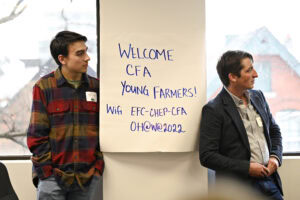
Katie Stewart is a fourth-generation farmer from the eastern Ontario community of Douglas, where she is involved in her family’s beef and sheep farming business. Katie is a graduate of Algonquin College’s Agriculture Business program as well as the Ontario Master Shepherd program. In addition to working as a farm insurance sales representative, Katie is also active in Renfrew County Junior Farmers and the Cobden and Renfrew fall fairs.
Carson Wagner is a sixth-generation dairy farmer from the New Hamburg area, where he farms with his parents and runs a custom bale wrapping business. He’s a member of Oxford County Junior Farmers and the current provincial president of the Junior Farmers’ Association of Ontario.
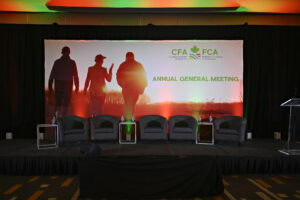
Why did you decide to participate in the CFA annual meeting as a young leader?
Jess: Attending the CFA AGM was an invaluable experience in terms of learning how the leaders in our industry are collaborating for the betterment of agriculture. It provided an opportunity, during a very tumultuous and unpredictable time, to see how our industry is navigating challenges related to climate, infrastructure, and trade.
Daniel: Although I have been involved in other young farmer leader programs, I have never been involved with OFA and CFA. I accepted the invitation as I knew I would learn more about the CFA as well as OFA’s involvement with CFA.
Katie: I decided to participate in the CFA annual meeting as a young leader to network with other young leaders in the agriculture sector as well as other farmers. I also wanted to learn from the OFA and other commodities groups.
Carson: I was interested about the young leader program that happens at CFA and how they want to continue to get more young leaders involved with the organization. I was also interested in hearing how other young leaders are involved with their fellow organizations.
What was your impression of the event and what did you learn from participating?
Jess: It was motivating to see all the individuals and organisations working to represent Canadian farmers. I also felt very welcomed by both CFA leaders and OFA directors. It was incredibly interesting to hear from other young farmers across the country about the challenges and successes they’ve encountered on their own farms and businesses. This was a unique takeaway from the experience, as it’s not often you have the chance to interact with young farmers from across Canada and across commodities.
Daniel: All of the organizations present were very welcoming to young farmers, and it was a very tight knit, collaborative group. My overall impression was positive, and I was able to see a side of agriculture that I don’t see on a day-to-day basis. It’s important that there are organizations lobbying on a federal level for what’s important for the Canadian food system.
Katie: Everyone was very kind and willing to teach to us young leaders when they could. The most important thing that I took away was that there was less provincial and commodity divide. Everyone was on the same page on the most important issues.
Carson: Overall, I was very impressed with the event. One thing I learned is don’t be afraid to ask questions, regardless of what they are. Everyone is always willing to help with an answer. It was very interesting hearing the resolutions being brought forward from the provinces and the discussion that came with them.
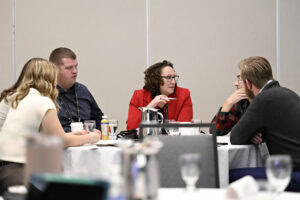
Name one thing that you learned today, that was surprising to you or that was your big takeaway from the day.
Jess: What surprised me the most was how welcoming the environment was and the investment in the “next generation” of agriculture. Leaders and directors were very approachable and went out of their way to engage with the young farmer group. One statement that really resonated with me was when one of the panelists said, “Young farmers may be the future of agriculture, but we are also the present.” We’re already here, working in the industry every day, excited for the future of agriculture, but equally committed to doing the hard work now to carve a place for ourselves.
Daniel: The most important takeaway for me was the fact that all these different organizations producing different products are coming together on a unified front to work with the issues in agriculture and solve tomorrow’s concerns that are arising today.
Katie: One thing that surprised me from the succession planning workshop were the success stories. It made me think about our area, local commodity groups, and how we could have people speak our annual meetings. If people hear that Farmer X can do it, then they will think they can too.
Carson: The problems we have as young farmers in Ontario are the same across Canada. From land access issues to succession planning, we all want to continue farming, but we realize that these are some of our biggest challenges to overcome. It was good to hear for everyone on how they have worked through their issues.
What advice would you have for other young people interested in farm organizations, farm politics and taking on leadership roles in the industry?
Jess: My advice for others interested in getting involved is:
- Say yes to opportunities, because no matter what there is always knowledge, experience, and insight to be gained from being actively involved.
- Ask questions and talk with those already involved. The people in our industry are eager to welcome young people into their organisations. They want you to participate, and they’re happy to share their knowledge on how policy issues are being addressed and how the system works. They want to help ease some of the intimidation we may feel stepping into the space and in my experience people in ag
Daniel: To the other young farmers, I would say: you may be hesitant to leave the farm because there’s a lot on our plate, especially young farmers trying to grow the business, but these events can be extremely valuable. They can be an excellent networking opportunity, open your mind to see a different side of agriculture, and spark the interest to get involved and try to make a difference in the future.
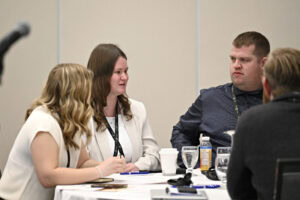
Katie: Nothing is going to change if we don’t join these groups and make it change. We can’t stand back and complain about the problems and not be willing to change them. Farm organizations can be a great place to network and can bring back great benefits back to your farm.
Carson: Don’t be afraid to step out of your comfort zone for these big moments. I used to be the person that would watch in the background and just listen in. You never know what you want to do unless you try it. I have had opportunities recently that I could have done in the past. Bringing friends to events like these can help people you get more comfortable and familiar with new groups.